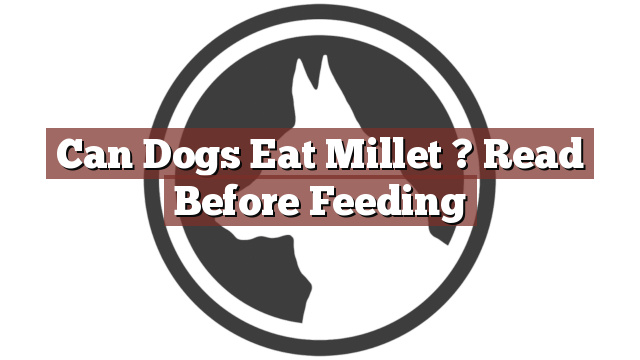Understanding Your Dog’s Dietary Needs
When it comes to our furry friends, understanding their dietary needs is crucial for their overall health and well-being. Dogs are primarily carnivores, meaning their bodies are designed to digest and derive nutrients from animal-based foods. However, they can also benefit from small amounts of certain grains and vegetables. It is essential to strike the right balance in their diet to ensure that they receive all the necessary nutrients.
Can Dogs Eat Millet? Read Before Feeding
Can dogs eat millet? The answer is yes, dogs can eat millet in moderation. Millet is a gluten-free grain that is widely used in human diets and increasingly popular as an ingredient in dog food. It is rich in fiber, protein, and various minerals such as magnesium and phosphorus. Millet can be a healthy addition to your dog’s diet, providing them with a source of energy and essential nutrients.
However, it is important to note that millet should not be the primary source of nutrition for dogs. While it can be a valuable addition, it should complement a balanced diet of high-quality dog food that meets all their nutritional requirements. Additionally, some dogs may have specific dietary sensitivities or allergies, so it is always a good idea to consult with your veterinarian before introducing any new food into your dog’s diet.
Pros and Cons of Feeding Millet to Your Dog
Feeding millet to your dog has several potential benefits. As mentioned earlier, millet is a nutritious grain that can provide fiber and protein. The fiber in millet can aid in digestion and promote a healthy bowel movement in dogs. It can also help regulate blood sugar levels and contribute to weight management.
On the other hand, there are a few considerations to keep in mind. Millet contains a moderate amount of carbohydrates, so if your dog has specific dietary needs, such as a low-carb diet, you may want to limit the amount of millet they consume. Additionally, some dogs may be allergic to grains, including millet, so it is crucial to monitor your dog for any adverse reactions after introducing it to their diet.
Conclusion
Can a dog eat millet? The answer is yes, dogs can eat millet as part of a balanced and varied diet. While millet provides various health benefits, it should not replace the primary source of nutrition in your dog’s diet. Always consult with your veterinarian before making any changes to your dog’s diet, especially if they have specific dietary needs or allergies. Remember, the key to a healthy and happy dog is a well-rounded diet that meets all their nutritional requirements.
Thank you for taking the time to read through our exploration of [page_title]. As every dog lover knows, our furry friends have unique dietary needs and responses, often varying from one canine to another. This is why it's paramount to approach any changes in their diet with caution and knowledge.
Before introducing any new treats or making alterations to your dog's diet based on our insights, it's crucial to consult with a veterinarian about [page_title]. Their expertise ensures that the choices you make are well-suited to your particular pet's health and well-being.
Even seemingly harmless foods can sometimes lead to allergic reactions or digestive issues, which is why monitoring your dog after introducing any new food item is essential.
The content provided here on [page_title] is crafted with care, thorough research, and a genuine love for dogs. Nevertheless, it serves as a general guideline and should not be considered a substitute for professional veterinary advice.
Always prioritize the expert insights of your veterinarian, and remember that the health and happiness of your furry companion come first.
May your journey with your pet continue to be filled with joy, love, and safe culinary adventures. Happy reading, and even happier snacking for your canine friend!

